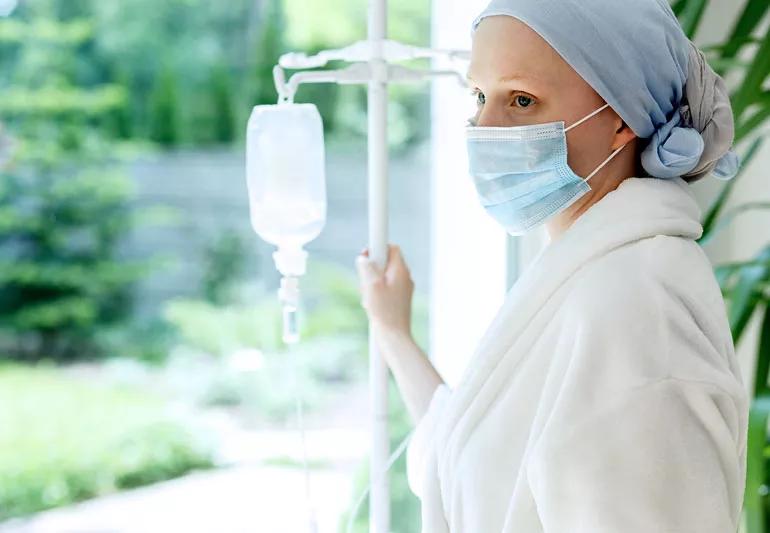A breast cancer specialist discusses if and when it's the right decision

Image content: This image is available to view online.
View image online (https://assets.clevelandclinic.org/transform/63f4c4cc-5f52-4fb5-9d31-0aee05a75b38/breastCancerChemo-820510734-770x553-1_jpg)
woman undergoing chemo treatment
When treating breast cancer there’s a common question that surgeons, breast cancer specialists and patients may explore.
Advertisement
Cleveland Clinic is a non-profit academic medical center. Advertising on our site helps support our mission. We do not endorse non-Cleveland Clinic products or services. Policy
Should we treat with chemotherapy before — or after — breast surgery?
“Traditionally we’ve done surgery first then follow up with chemotherapy or other treatments,” says breast cancer specialist Halle Moore, MD, “But for certain patients it makes more sense to reverse the order.”
Thanks to improvements in chemotherapy and new thinking about the order of treatment, providing chemotherapy prior to breast cancer surgery has become a successful treatment for many patients.
Neoadjuvant therapy is a treatment approach which focuses on this type of reverse order. The idea is to first shrink the tumor with chemotherapy before any next steps, specifically surgery.
“This approach not only can improve surgical options, but also allows for a better assessment of the patient’s response to the chemotherapy,” Dr. Moore says. “It can also inform better recommendations for follow-up treatments after surgery. The approach doesn’t work for everyone, but it’s certainly worth discussing with your doctor to find out if you’re a candidate.”
Keep in mind, not all breast cancers require chemotherapy. And only certain tumors qualify for neoadjuvant chemotherapy.
In the past, neoadjuvant therapy was primarily given for locally advanced or inoperable cancers in order to improve the chances of a successful surgery.
Advertisement
But newer studies showed that for tumors that were in fact operable, giving chemotherapy before surgery improved the chances of breast conserving surgery, and often eliminating the need for a mastectomy in many patients.
Certain factors are considered in the choice to give neoadjuvant chemotherapy. These include the size of the tumor, evidence of lymph node involvement as well as the type of breast cancer.
“Some specific types of breast cancer are more likely to respond to neoadjuvant chemotherapy,” Dr. Moore says.
Unless the tumor is very small and shows no lymph node involvement most patients with either triple-negative breast cancer or HER2-positive breast cancer will be candidates for chemotherapy — either pre-operatively or post-operatively.
In the best cases, this therapy can completely eradicate all visible tumor from the breast, producing what is called a pathologic complete response. This means a pathologist finds no trace of the invasive tumor in the breast or lymph nodes after treatment.
That’s good news not only in the short term, but also over a patient’s lifetime as the presence of a complete response is generally associated with an excellent prognosis.
For patients who do not have a complete response to neoadjuvant chemotherapy, additional treatments can also be administered in the post-operative or “adjuvant” setting to improve long-term outcomes. In this way, treatments can be individualized. Often this means applying more intensive treatments to those at higher risk.
For women with estrogen receptor-positive breast cancer (the most common type) neoadjuvant chemotherapy may not always be the best option. In select patients, anti-estrogen therapy may instead help shrink a tumor before surgery , Dr. Moore says.
Neoadjuvant therapy is not limited to chemotherapy. For example, the anti-HER2 medications trastuzumab and pertuzumab (injection-based antibody treatments) are known to improve the outcomes in HER2-positive breast cancer, when added to chemotherapy.
“If you have breast cancer, the importance for you to consult with a multidisciplinary team prior to initiating treatment can’t be overstated — it can be a lot to take in, but you’re not alone and they’re there to help,” Dr. Moore says.
“The goal is to individually tailor your therapy to avoid both undertreatment and over treatment of the cancer,” she emphasizes. “Rest assured your medical team will always walk you through what the best options are for you personally.”
Advertisement

Sign up for our Health Essentials emails for expert guidance on nutrition, fitness, sleep, skin care and more.
Learn more about our editorial process.
Advertisement
Research consistently shows that soy-based foods do not increase your risk of breast cancer
Breast cancer’s growth rate depends on its type, stage, grade and more
Breast cancer typically spreads to your lymph nodes first, and can travel to your lungs, bones and more
Many breast cancer survivors have babies — talk to your provider before treatment to understand all of your options
A second opinion can confirm your diagnosis and treatment plan and help you feel more confident about what’s next
HER2-low is less aggressive than HER2-positive and HER2-negative, but the new designation allows for targeted therapies that may be helpful
Taking care of yourself extends beyond symptom management and includes things like passion projects and meaningful moments
Support groups, financial assistance and survivorship programs are all readily available
Prioritize your health by managing stress, strengthening your social connections and getting quality sleep
Bolsters, blankets, pillows and blocks can offer extra support, stability and comfort
Allergies, postnasal drip, asthma or reflux could be to blame for a cough that won’t quit